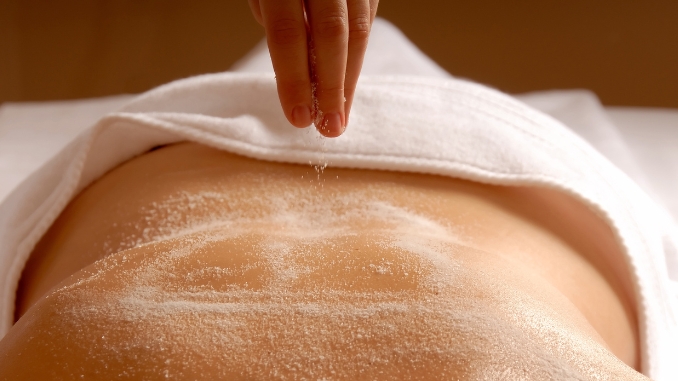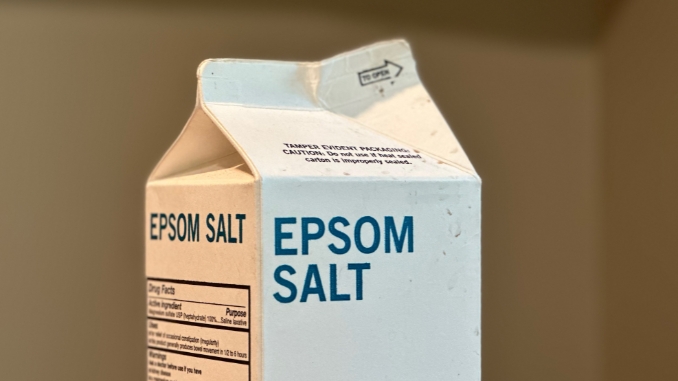Epsom salt, a distinct chemical compound known as magnesium sulfate, has long been praised for its soothing properties, especially in baths.
But is it actually good for your skin? Let’s dive into the science, benefits, and expert insights to find out.
What Is Epsom Salt (Magnesium Sulfate)?

Epsom salt, or magnesium sulfate [1], is a naturally occurring mineral compound that belongs to the group of magnesium salts.
Despite its name, it’s not a true salt but a mix of magnesium, sulfur, and oxygen. It dissolves easily in warm water, making it a popular addition to baths and skincare routines.
How Does It Work?
When dissolved in water, Epsom salt releases magnesium [2] and sulfate ions.
Some believe these minerals can be absorbed through the skin, promoting relaxation and reducing muscle tension.
While the benefits of transdermal absorption are not scientifically proven, many users report noticeable benefits for their skin and overall well-being.
Benefits of Epsom Salt for Skin
Dr. Whitney Bowe, Board-Certified Dermatologist emphasizes that while Epsom salt can provide temporary relief for certain skin conditions, including dry skin, it’s not a cure-all.
“It’s a great addition to skincare routines, but those with sensitive skin should use it in moderation to avoid irritation.”
1. Exfoliation

Epsom salt’s coarse texture makes it a natural exfoliant, helping remove dead skin cells and unclog pores.
Mixing it with a mild cleanser or oil can create a gentle scrub for smoother, softer skin. The Epsom Salt Council endorses Epsom salt as an effective exfoliant.
2. Soothing Irritated Skin
Many people use Epsom salt baths [3] to relieve itchy, dry, or irritated skin caused by eczema, psoriasis, or sunburn.
The National Psoriasis Association recommends Epsom salt as one of the effective natural remedies for alleviating psoriasis symptoms such as painful, itchy plaques and scales.
The magnesium content may help reduce inflammation and promote healing.
3. Reducing Acne and Blemishes
Epsom salt has antimicrobial properties that can help fight acne-causing bacteria and control excess oil.
It also helps reduce swelling and redness, making it a useful spot treatment. Additionally, Epsom salt foot soaks are effective for treating ingrown toenails.
4. Detoxification

Soaking in an Epsom salt bath may help draw out toxins and impurities from the skin, leaving it refreshed and rejuvenated.
5. Relieving Stress-Related Skin Issues and Soothe Tired Muscles
Magnesium salts are known to help reduce stress and promote relaxation.
Since stress can trigger breakouts and inflammation, an Epsom salt soak may indirectly help improve skin health by calming the nervous system.
Epsom Salt Bath Benefits
Epsom salt baths have been cherished for centuries as a natural remedy to soothe tired muscles and improve overall well-being. The benefits of soaking in an Epsom salt bath are numerous and can significantly enhance your skincare routine.
Here are some of the key advantages:
- Reduced Muscle Soreness and Pain: The magnesium in Epsom salts helps to relax muscles and alleviate pain, making it a popular choice for athletes and those with physically demanding lifestyles.
- Improved Sleep Quality: A warm Epsom salt bath before bed can promote relaxation and improve sleep quality, thanks to the calming effects of magnesium.
- Reduced Inflammation: Epsom salt baths can help reduce inflammation, making them beneficial for conditions like arthritis and minor injuries.
- Improved Skin Health: The exfoliating properties of Epsom salt help remove dead skin cells, leaving your skin feeling soft and rejuvenated.
- Reduced Stress and Anxiety: The soothing properties of magnesium sulfate can help reduce stress and anxiety, promoting a sense of calm and well-being.
Precautions and Risks

While Epsom salt baths are generally safe and beneficial, it’s important to be aware of potential risks and precautions. Here are some considerations to keep in mind:
- Diarrhea: Ingesting Epsom salt can act as a laxative, leading to diarrhea. Always consult a healthcare professional before consuming it.
- Stomach Cramps: Overuse or ingestion of Epsom salt can cause stomach cramps and discomfort.
- Nausea and Vomiting: Some individuals may experience nausea or vomiting after using Epsom salt baths, especially if they have sensitive skin or underlying health conditions.
- Severe Skin Inflammation: Those with sensitive skin or severe skin conditions should use Epsom salt baths with caution, as it may exacerbate inflammation.
- Skin Infection: If you have open wounds or skin infections, avoid using Epsom salt baths as they may worsen the condition.
- Itchy Skin: Some people may experience itchy skin after using Epsom salt baths. It’s advisable to test a small patch of skin with magnesium sulfate and water before a full bath.
Consulting with a healthcare professional is crucial before incorporating Epsom salt baths into your routine, especially if you have any underlying medical conditions or are pregnant.
A patch test can also help ensure you do not have any adverse reactions to magnesium sulfate.
Can a Person Drink Epsom Salt for Ingrown Toenails?
Yes, but with caution. Epsom salt is sometimes used as a laxative when dissolved in water and taken orally.
However, consuming too much can lead to dehydration, diarrhea, and electrolyte imbalances.
Always consult a doctor before ingesting Epsom salt, especially if you have kidney problems or other health conditions.
Final Thoughts
So, is Epsom salt good for the skin? The short answer is yes—for many people, it can help exfoliate, soothe irritation, and reduce acne.
While it may not be a miracle solution, adding it to your bath or skincare routine can be a simple, natural way to promote healthier skin.
Just be mindful of how your skin reacts and avoid overuse.
Have you tried Epsom salt for skincare? Share your experience in the comments!
Find out why collagen is the real secret to vitality – and why everyone from celebrities to fitness experts to busy moms are using it to look younger, reduce joint pain, build muscle mass and enhance cardiovascular health. Check out this Guide to Collagen now!

Frequently Asked Questions
Can I apply Epsom salt directly on my skin?
No, Epsom salt should be dissolved in water before applying to avoid skin irritation.
Is it OK to soak in Epsom salt daily?
Yes, but excessive use may dry out your skin. Limit soaks to 2–3 times per week if you notice dryness.
What toxins does Epsom salt remove?
There’s no scientific proof that Epsom salt removes toxins, but it may help relax muscles and support skin health.
Can I use Epsom salt on my face every day?
No, daily use can be too harsh and drying for facial skin. Use it occasionally as a gentle exfoliant.

Rick Kaselj MS, is a leading kinesiologist and injury specialist as well as co-creator of the best-selling Unlock Your Hip Flexors program. Rick creates exercise programs that help people heal injuries and eliminate pain, so they can go back to living a full, active, healthy life.



